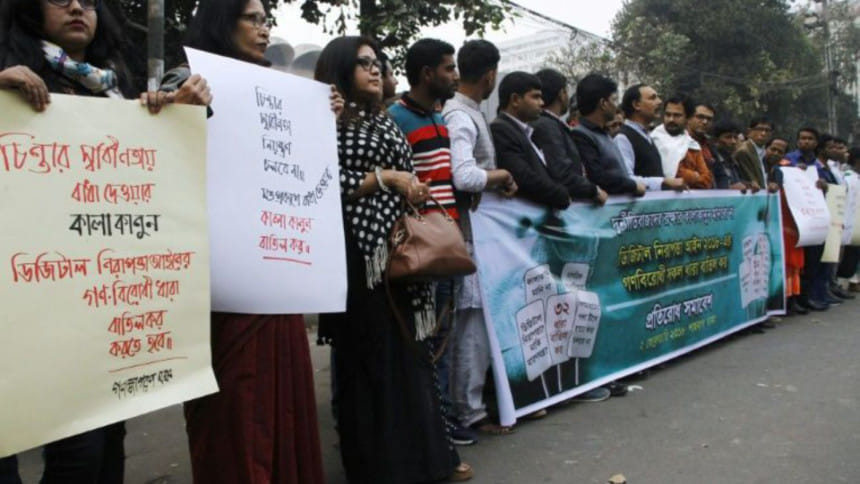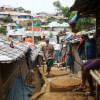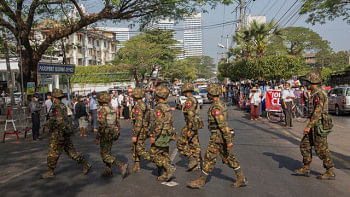A crucial stocktaking

Today, Bangladesh's human rights situation will be reviewed at the United Nations' Human Rights Council in Geneva, under the Universal Periodic Review (UPR) mechanism. The UN Human Rights Council carries out UPR review every four and a half years and this is the third-cycle review for Bangladesh.
Along with the state report, various UN organisations, national and international human rights organisations, civil society organisations (CSOs), and the National Human Rights Commission of Bangladesh submitted their reports under this review process. During a three-hour interactive session, representatives of the Government of Bangladesh (GoB) will present the initiatives and measures undertaken by the government to improve the country's existing human rights situation as well as the progress of implementation of various recommendations made by the government during the second-cycle UPR in 2013.
On the basis of this, other member states of the UN may ask questions and make recommendations. The GoB can accept those recommendations or may reject them giving justifications for rejections, if any. The GoB may also make some voluntary pledges to improve the human rights situation in the country.
The Human Rights Forum Bangladesh (HRFB), since its inception, has been actively involved in this process. In fact, the Forum emerged as a result of an initiative by some leading human rights organisations of Bangladesh which joined hands to work together in the UPR process in 2007. The Forum subsequently expanded its work beyond reporting to the Geneva process, and has been undertaking stakeholder engagement and advocacy initiatives to defend and advance human rights in the country. At present, 20 organisations are members of this Forum, with ASK working as its secretariat.
Like the previous two UPR sessions, the Forum has submitted a comprehensive shadow report parallel with the government report. This report has been produced based on data and information gathered from the Forum's own and other sources and has made some precise recommendations for the GoB. This is also intended to draw the attention of other UN member states so they may take it into consideration while making recommendations to the GoB to promote and protect human rights in Bangladesh. In this cycle of UPR, 29 stakeholder reports from various national and international human rights organisations have been submitted.
On April12, 2018, a Geneva-based non-governmental organisation called UPR-Info organised a pre-session discussion with member states and civil society members from Bangladesh including Forum representatives who attended the discussion and made verbal statements. They covered a wide range of human rights issues based on the submitted report. In their statement, Forum representatives recommended to make time-bound commitments to reform relevant laws to address enforced disappearances; establish an independent commission to ensure transparent and accountable investigation of all alleged human rights violations by state agencies and to ensure enforcement of the Torture and Custodial Death (Deterrent) Act, 2013 and refrain from any regressive amendment to the Act; and also enforce the Supreme Court Guidelines. They also demanded the repeal of all regressive and restrictive provisions of the laws and to refrain from adopting any laws which are detrimental to citizens' freedom of expression and association and assembly.
To attend the actual review session to be held today, a delegation from Human Rights Forum Bangladesh is currently visiting Geneva headed by Forum convener for further lobbying with the member states to raise human rights issues. It is evident from their discussions with various stakeholders, experts, diplomats and representatives from international organisations that issues like freedom of expression, freedom of press, extrajudicial killings, enforced disappearances, right to protest and assembly, independence of judiciary, strengthening the National Human Rights Commission, the Rohingya issue, repealing special provision of Child Marriage Restraint Act 2017, review of the Draft Digital Security Act 2018, enacting the Anti-Discriminatory Act, and rights of indigenous communities and other minorities will be prioritised.
In addition, implementation status of the recommendations from the second cycle will be assessed extensively. After the review session today, the final report will be prepared and adopted at the UN Human Rights Council on May 17, 2018. The third cycle of the UPR session is thus very important for various reasons.
Firstly, the current GoB has been in power for two consecutive terms and has had enough time to improve the human rights situation, especially to implement commitments made in Geneva during the second cycle. As per usual practice, the member states would like to review what progress has been made.
Secondly, Bangladesh is currently on track to be ranked as a developing country and the government is also committed to achieve the Sustainable Development Goals (SDGs) by 2030. Human rights and justice for all, leaving no one behind, are among the basic elements in the set of pledges made under the SDGs, goal 16 in particular. Therefore, it would be of member states' interest to learn how the Bangladesh government is going to mainstream issues of human rights, justice and equity in the development agenda for the period leading up to 2030.
Thirdly, there is a possibility that the government will highlight its priorities such as economic development, countering threats of terrorism, and managing the challenges arising from the massive influx of Rohingyas, which are most likely to draw solidarity of the international community. It remains to be seen if such matters overshadow equally genuine concerns for human rights, justice and equity, without which neither development nor the capacity to cope with terrorism and Rohingya-related challenges can be sustainable.
Fourthly, there will be a national parliamentary election this year. It would not be surprising if the participating member states' interest in civil and political rights, especially those related to inclusive election and ensuring people's right to vote, is accompanied by expectations of a more specific and time-bound action plan to implement commitments made on the basis of recommendations from the earlier cycle of UPR.
The uniqueness of the UPR process is that while each of the other UN human rights treaty bodies focuses on one particular topic based on the specific treaty, the UPR process covers comprehensive human rights issues. Thus a state's efforts in improving its overall human rights conditions are assessed against its commitments made under the UN human rights mechanism as well as against the obligations laid out by the Constitution and the national laws of the country.
Sheepa Hafiza is the convener of Human Rights Forum Bangladesh (HRFB), a coalition of 20 human rights and development organisations.









Comments